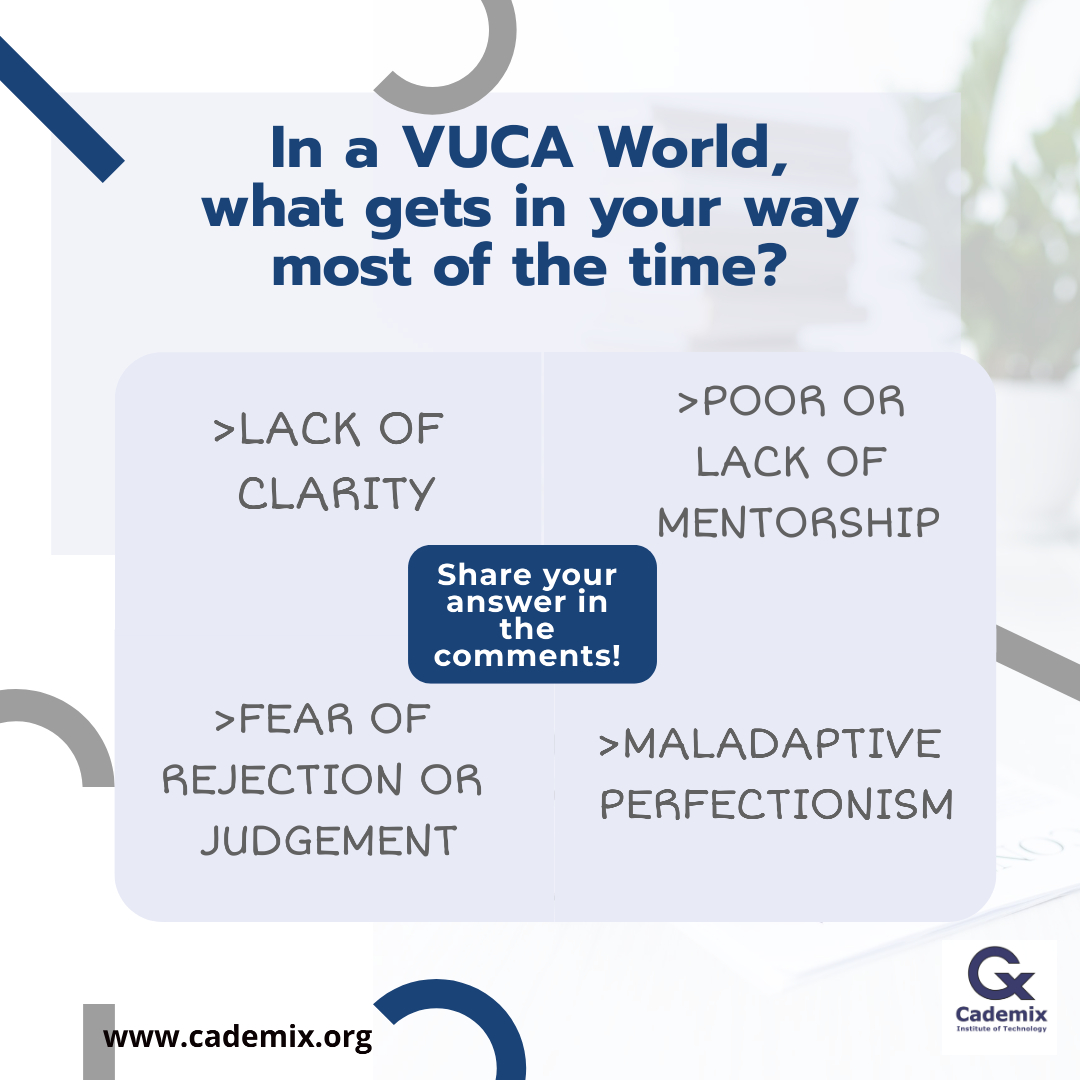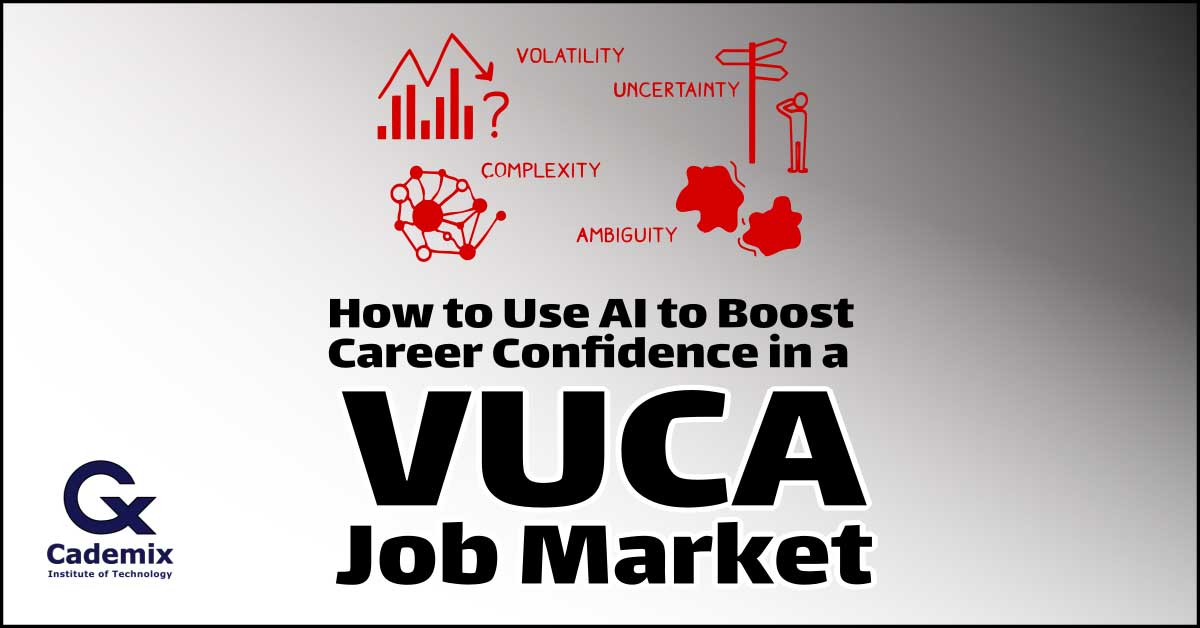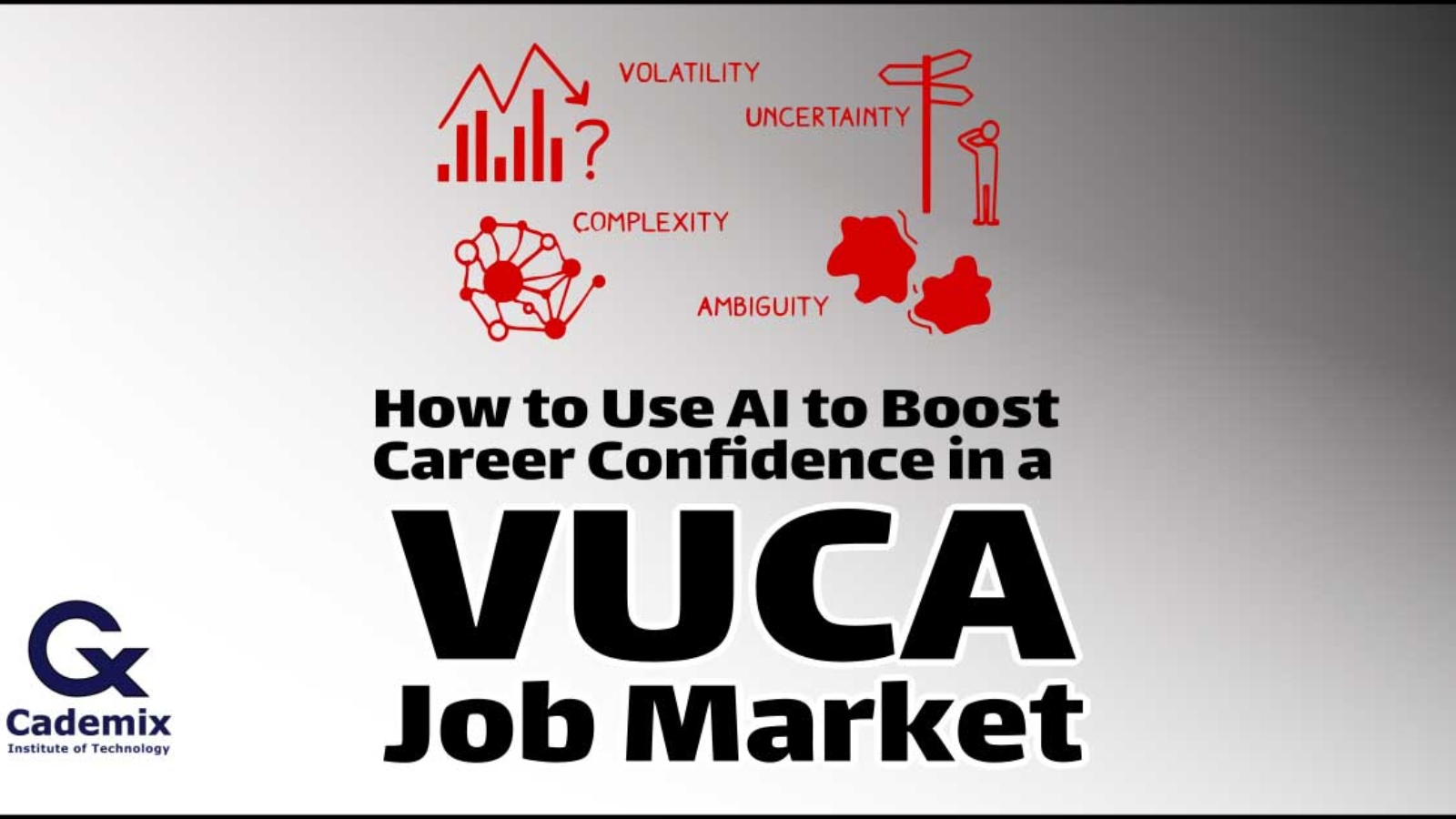This article explores the challenges posed by the VUCA (volatility, uncertainty, complexity, and ambiguity) job market, intensified by rapid advancements in AI technologies. It discusses how AI has exacerbated the VUCA world and offers insights on how job seekers and professionals can leverage AI as a solution to navigate the complexities and uncertainties of the evolving job landscape. By utilizing AI tools and strategies in the age of AI to boost Career in a VUCA Job Market, individuals can better adapt to the VUCA job market and increase their chances of securing the right opportunities in an ever-changing world.
By Cademix Editorial Board
Today’s world has been described as the “new normal,” “business as unusual,” and even “permaweird.” Job seekers and professionals around the globe are facing challenges such as:
Applicants are asking: How can I build connections and network without in-person interactions?
Hiring managers are wondering: How can we assess candidates’ abilities and potential without traditional face-to-face interviews?
Professionals are concerned: How can I forecast and adapt to job market changes amid all this chaos and volatility?
In this post, we will introduce a framework, VUCA, and describe how AI can help job seekers and professionals boost confidence.

False Versus True Confidence: The Hardest Question
VUCA stands for “volatility, uncertainty, complexity, and ambiguity” of conditions. Coined by the U.S. Army War College as a way to describe the multipolar world after the Cold War, the concept has applicability beyond its original roots, especially for professionals navigating new health, economic, and environmental crises. Here’s a simple way to illustrate the framework. Are you:
Facing rapid change, the magnitude of which is unpredictable (i.e., job market demands are constantly shifting)? That’s Volatility. Feeling unclear about the present and future (i.e., you don’t know if your industry will be stable in the coming years)? That’s Uncertainty. Experiencing chaos because of different factors acting at the same time (i.e., a company merger impacts your position)? That’s Complexity. Feeling less aware and clear than usual (i.e., job descriptions are vague and unclear)? That’s Ambiguity.
Surviving and growing confidence in VUCA environments is difficult, and that’s where false versus true confidence comes in. Many professionals might have a veneer of false confidence from observing simplistic effects; for example, adapting to remote work or receiving a promotion. However, true confidence comes from tackling the hardest questions, such as: What do we not know that could hurt our career prospects in a VUCA world? Countering VUCA With Predictive AI
VUCA can paralyze individuals and affect their career prospects. To counter VUCA, professionals need to systematically address each of its components for the age of AI to boost Career in a VUCA Job Market.
Volatility:
A clear career goal is essential. Knowing where you want to go helps navigate unexpected changes and challenges.
Uncertainty:
Understanding the future by imagining different scenarios is crucial. This includes potential industry changes and learning from analogous domains.
Complexity:
Simplifying assumptions and focusing on core skills can increase clarity. Collaborating with others and expanding your network can help.
Ambiguity:
Moving quickly and adapting to change is key. Additionally, equipping yourself with tools that help overcome cognitive biases helps.
To tackle the challenges of VUCA, AI can assist in various areas, as listed above. For example, time-series predictive AI can analyze various data sets, such as job market trends, industry developments, and skill requirements, to provide valuable insights. Therefore, it can offer critical support to job seekers and professionals in a VUCA job market. To illustrate how predictive AI can help, let’s examine an example.
For instance, AI can help in the job search process by providing personalized job recommendations that ideally suit an individual’s skills, experiences, and preferences. Moreover, AI can provide useful insights into skill requirements and emerging trends in the job market. By leveraging such information, job seekers and professionals can stay ahead of the curve in a rapidly changing job market. In summary, AI can be an invaluable tool to help individuals navigate the complexities of a VUCA job market.
Identify which industries are at risk or have growth potential. Analyze skill gaps and emerging demands in the job market. Provide personalized recommendations for upskilling or reskilling.
Making It Real: How AI Guidance Can Counter VUCA To Empower Job Seekers And Professionals
With face-to-face networking and traditional job-seeking methods being limited, individuals can turn to AI guidance to adapt and thrive in a virtual job market. To successfully navigate this transition with AI guidance, consider the following steps:
Set a clear career goal, considering both your past successes and the ability to adapt to the evolving job market.
Consolidate multiple communication channels into collaboration workspaces, with AI insights provided alongside human interaction (AI as an extended team). Regularly update your skills and knowledge, using AI-driven recommendations to identify areas that are directly correlated with career success.
AI and the Intensification of the VUCA World
In the early 2020s, rapid technological advancements, including those related to AI, have intensified the VUCA world. This has made the job market even more complex and uncertain for job seekers and professionals. In this article, we will examine how AI has contributed to this situation by providing facts and arguments.
- Accelerated pace of change: The rapid development and adoption of AI technologies have led to an accelerated pace of change across industries. This makes it difficult for job seekers and professionals to keep up with the evolving job market landscape.
- Increased automation: AI-powered automation has resulted in the displacement of certain jobs. This has increased uncertainty for professionals in roles susceptible to being automated.
- Skill gaps: The rapid development of AI technologies has created new skill gaps. Job requirements shift to accommodate these advancements, contributing to the complexity of the job market.
- Ethical and social concerns: As AI becomes more integrated into our lives, ethical and social concerns arise. These concerns surround privacy, fairness, and transparency, adding to the ambiguity of the job market and the future of work.
AI as a Part of the Solution
Although AI has contributed to the intensification of the VUCA world, it can also be a part of the solution. By using AI to navigate the complexities of the job market and adapt to the changing landscape, job seekers and professionals can take advantage of this technology. In this article, we will explore how AI can help individuals thrive in the new VUCA world. To do so, we will provide arguments and advice that highlight the benefits of leveraging AI.
- Skills development: AI-powered learning platforms can identify relevant courses and certifications. These help job seekers and professionals upskill or reskill, closing skill gaps. They also increase adaptability to the evolving job market.
- AI-Powered Job Matching: AI-driven algorithms personalize job matching. They do this by analyzing an individual’s skills, experiences, and preferences. This approach yields job recommendations that ideally suit the individual. It also reduces uncertainties in the job search process.
- Networking and mentorship: AI-powered networking platforms can connect job seekers with industry professionals and mentors. These connections help them gain valuable insights and guidance on navigating the VUCA job market.
- Enhanced decision-making: AI provides real-time data and predictive analytics. These help job seekers and professionals make informed decisions on industry trends, job market demands, and potential career paths. This enables them to better anticipate and adapt to the VUCA world.
By embracing AI as a solution, job seekers and professionals can better navigate the VUCA job market. This can help them increase their adaptability and secure the right opportunities in an ever-changing world.

A Compass for AI to boost Career in a VUCA Job Market
To achieve growth and adaptability, you can embrace advanced frameworks like VUCA. Using technologies like predictive AI can help you acquire new skills to succeed. With the right strategy and AI, you can analyze the past, optimize the present, and prepare for the future of your career. By utilizing AI to navigate the VUCA job market, you can boost your confidence and increase your chances of finding the right opportunities. In today’s ever-changing world, AI can be a valuable tool to help you stay ahead.
A Mentor in the age of AI to boost Career in a VUCA Job Market
Having a mentor or an experienced career advisor can be invaluable when navigating the VUCA job market. A mentor can provide guidance and support, sharing their experience and expertise to help you develop your skills and advance your career. An experienced career advisor can also provide valuable insights and advice on job opportunities, industry trends, and the latest hiring practices.
A mentor, career advisor or a career acceleration program, can help you identify your strengths, areas for improvement, and potential career paths. They can also help you build a strong network, connect you with other professionals in your field, and provide feedback on your job search strategies.
Having a mentor or career advisor can make a significant difference in your career trajectory, particularly in challenging times. They can help you stay motivated, focused, and confident as you navigate the job market. So, consider seeking out a mentor or career advisor to help you achieve your career goals and succeed in the VUCA world.

